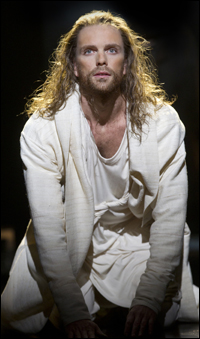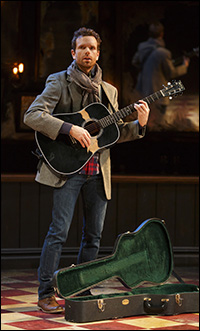
*
Following his run in the title role in the Tony Award-nominated revival of Jesus Christ Superstar — which transferred to Broadway after a critically acclaimed engagement at the Stratford Shakespeare Festival in Ontario — Paul Nolan returned to the Canadian festival for repertory productions of The Who's Tommy (directed by Superstar director Des McAnuff) and Fiddler on the Roof. He now lands back on Broadway in the Tony Award-winning musical Once, where he stars as "Guy," the Dublin busker and vacuum-repair man "Falling Slowly" for the awkward Czech "Girl," who — after hearing him sing from the depths of his soul — asks to have her Hoover fixed. Nolan, who stepped into Once shortly before 2013 came to a close, chatted with Playbill.com a few weeks into his run.
When we last talked, you were in Jesus Christ Superstar. Since then, you've been working a lot with fellow JCS cast member Jeremy Kushnier, [who also understudied the role of Jesus]. After Superstar, you both did a film and then went back to Stratford.
Paul Nolan: Tommy and Fiddler on the Roof, yeah! Fiddler on the Roof, Tommy and the movie were all kind of linked together. Fiddler and Tommy because we were at the Stratford Festival doing it, which is repertory theatre, so we were doing those in rep, but the movie, [entitled "Will," about two estranged brothers], we were connected to it because his brother [Serge Kushnier] is the director-writer of it. Jeremy, of course, was a shoe-in, and they thought of me for it, and the rest is history. I love working with Jeremy. I think he's a really great actor and, obviously, a phenomenal singer. I just really get along with him. It's always really fun to work with your friends — you just feel more relaxed. We shot that [film] in about six hours, and it turned out really well.
And, now you're in Once. Tell me about coming in — I hear that the process can be very quick. I'm interested in how you get put into this show, since you are not only the actor, but the "orchestra" as well.
PN: It's quick, and it's not. I was here for five weeks before I stepped on stage and did the show. What's quick about it is that there are only so many hours in a day, and the cast can't be called in every day. There are certain slots of time in the week that they can be called, so I worked with the understudies a lot — every Thursday, they have a four-hour understudy call, and I was in that call. And, Fridays, the cover for "Girl," Jessie [Fisher], and I would work together… Two times I think Joanna [Christie, who plays "Girl"] and I were called on a Tuesday afternoon.
The terrifying thing about [being "put-in"] is that I'm used to fully fleshing something out in a rehearsal process. I've never been a replacement, so most of the percentage of hours I put in were on my own. I mean, of course, I'd have music rehearsals as well. We had a three-hour call that I got to play all the music with the company, but a bulk of that work — I would say 30 percent of that time was rehearsing with other people, and 70 percent was on my own in my dressing room or at home. You put in a lot of hours for these things.
| |
 |
|
| Nolan in Jesus Christ Superstar. | ||
| photo by Joan Marcus |
PN: No. Compared to these guys, I'm an amateur! These guys are amazing musicians. It was terrifying. That's honestly the most terrifying thing I've ever had to do. It was like having an actor's nightmare and an actor's dream at the same time because I love this show so much — I had seen Cristin [Milioti] and Steve [Kazee] do it back in the original company, so I have a lot of reverence for this company and for this show. The terrifying thing was coming in and playing a guitar in front of people. I'm basically self-taught, the way that lots of musicians have [been], but… [Laughs.] The thing is I knew I could play it — absolutely knew I could play this show — I just knew that it would take me a lot more time to have it in a place that I could do it in front of an audience and not really, really… shit the bed! To put it more eloquently, not just fall apart. It's constantly something I've got to work on. First of all, it's an essential part of this job, and anyone has to work at what they do. I mean, I'm more confident as an actor-singer, [but] even though those are things I have confidence with doesn't mean I don't work at it. It's the same thing with the guitar; I just have to put in a lot more hours than these guys.
How old were you when you first picked up a guitar?
PN: Gosh, I think I was maybe 27 or 28, but I didn't really play it very much. I played the same song over and over again. The reason I started learning was because my sister wanted me to sing at her wedding, and it was a small wedding, so I didn't really think it would be appropriate to hire a piano player to — I'm from a farm — come out to the farm. It was all family and really intimate. It wasn't the kind of wedding that you hire someone, a stranger, to come out and play for, so I decided, "I'll learn the song on guitar," and that was my introduction to playing. Eventually, I bought a guitar and started playing more. That's kind of it.
| |
 |
|
| Nolan in Once. | ||
| Photo by Joan Marcus |
PN: It was "'Til Kingdom Come" by Coldplay. I honestly didn't start playing a ton until — I don't even know… It just kind of happened gradually. "Once," the movie, made me play a lot more, to be honest, but I couldn't play most of the songs. At that point, I didn't understand tunings, and eventually I discovered [the website] Ultimate Guitar Tabs on the Internet. The more popular that's gotten, the better the tab charts have been, so I gradually learned to play like that.
You were a fan of the movie before you went into the show?
PN: Yeah, I saw the movie on a plane from Toronto to Saskatoon on my way out to do a contract in Saskatoon, Canada. It was really new. No one had heard about it, and I [thought], "What is this?" I fell in love with Glen [Hansard]'s music and Markéta [Irglová]'s music and loved the movie.
When you're playing the guitar, do you feel more connected to the music and the material? As a performer, being accompanied by someone else and being accompanied by yourself are very different experiences, yes?
PN: The ultimate goal, for me, is to be playing so well I'm really not thinking about my hands as much. My interest in music is — whether it be Once or West Side Story — that it needs to come from the Earth, so it's like channeled through you. It's tricky when you've got to put a lot of attention to something that you're not used to putting attention into, for sure. Whether it be Tommy or Jesus Christ Superstar or Les Miz, I don't see music, ever, as performance; I see it as communication. The goal for me is to sing from the guts, and that takes time to build your imaginative world. When Glen sings his music, he's not thinking about performance. It's coming from somewhere deep in his psychology and his body. He's not trying to do anything. He's simply expressing his life through music, and, I mean, that's what Guy should be.
Obviously, this is a very different mode of musical theatre that Once has brought to Broadway — but I do notice, for me at least, [an] interconnectedness from where I choose to work from. I don't know if that's an intrinsic thing or if that's just me…
That's what Guy is really about — he lets the music take over him, and these songs are deeply confessional. What excites you about taking on something that makes you very vulnerable throughout the night?
PN: Well, being an artist is vulnerability, right? And, obviously, there are parts that you play that are less vulnerable, but to reach an audience, there's still vulnerability there. First of all, I don't like to discuss too much [about that side of] characters because a lot of the work is done by an audience… As an actor, you're already a part of a lot of different factors — starting with the script. The script really is our job — our job is to serve that script and to serve that music. As far as vulnerability, that's also my job — to let my heart out — and that's a work in progress, always. If your heart isn't out there, it can never touch an audience. People are moved by other people's vulnerability, at least in live theatre, and that, to me, makes it exciting. I have trouble talking about that side of things because so much of what we do is unconscious in the end, you know? (Playbill.com staff writer Michael Gioia's work appears in the news, feature and video sections of Playbill.com as well as in the pages of Playbill magazine. Follow him on Twitter at @PlaybillMichael.)
Watch the pre-show at Broadway's Once:









